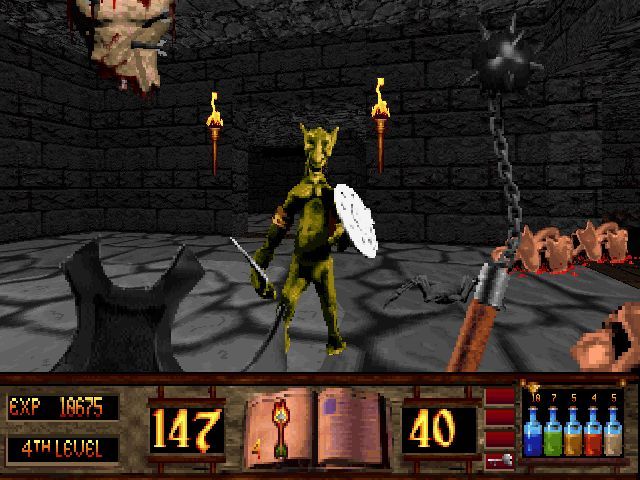Art by Ken Kelly
Witchaven, developed by Capstone in 1995, is an early attempt at doing a melee-focused FPS. There had certainly been first-person games with fantasy themes, but Ultima Underworld and Elder Scrolls: Arena were more focused on creating a real-time RPG experience, and Heretic was essentially Doom but more heavily tilted toward a fantasy theme. Witchaven is more about the speed of the FPS genre but with melee weapons and modest RPG elements included.
The premise is that the player controls a knight named Grondoval who has traveled to an island under the control of a witch named Illwhyrin. Illwhyrin is performing grotesque rituals so she can call forth demons to unleash on the world. By killing her, you can make the whole problem go away.
The weapons you use to do the job include a dagger, a short sword, a flail, a broadsword, a bow, throwing axes, a battle axe, a halberd, and a magic sword. The weapons degrade with use (effectively equivalent to the ammo needed in regular FPSs) and need to be replaced when damaged, although you can always resort to your fists if necessary. There are different suits of armor that can be picked up, and a shield can further reduce damage, but if the shield is destroyed the player can dual wield his weapons. The player can also use magical scrolls to do things such as illuminate dark areas, force open doors, cast magic missiles, or even fly. Scroll use is restricted by the player's experience level, which goes up by killing enemies. Finally, there are potions that can be accumulated and used for health refills, curing poison, resisting fire, or getting certain kinds of boosts for combat.
Among the monsters are goblins, undead skeletons, magic-slinging hags, fire demons, ogres, and even occasional dragons. Illwhyrin herself will appear in a few levels during the game, teasing the player on the way to the final confrontation. Many of the monsters are claymation models, while Illwhyrin is played in digitized form by Capstone's product manager Judy Melby.
Advancement through the levels is the classic FPS method of picking up colored keys for corresponding doors, although to use the exit the player needs to also find a magical pentagram and bring it to the exit to be teleported to the next level.
Witchaven, apparently based on a tabletop RPG, is the first game officially made with Ken Silverman's Build engine, being released just ahead of Capstone's game based on William Shatner's TekWar novels. It uses certain Build engine tricks such as levels with more verticality than you'd see in Doom, halls twisting above other halls, and large chunks of scenery shifting when triggered.
The game is a classic case of being more interesting than good. One of the reasons why there are relatively few first-person melee-fighting games is because it's hard to create a sense of weight or impact from that perspective and Witchaven isn't one of the games to transcend this problem. You do get used to the attack system (and the game gets almost comically easy when you do) and how to time strikes so the weapon is falling down on the enemy at the right moment, but it doesn't feel good. You watch the weapon come down and maybe it registers a hit and maybe it doesn't. The art direction is nothing special and the game looks ugly and jagged compared to the more popular entries in the genre. The character actually strafes faster than he walks forward, even when in water. Some levels are outright bugged - I was stumped on one level only to look up the problem online and discover that the level suffers from a button that doesn't work, requiring that the player use the open door spell to proceed. One wonders if the whole reason for spells like open door or flight was as much to work around bugs as proper level design. Attempts at atmospheric lighting don't seem to work quite right and even using the light spell doesn't help much. The soundtrack is mediocre and buggy as it often seems to revert to a single track. The dragons look goofy and barely move, content to just breathe fire on the player, and if you've taken the resist fire potion they're completely helpless while the potion is active.
With all that said, the game has just enough to keep you playing if you're feeling indulgent and have maybe played through all the more notable FPSs. The game earned a certain amount of notoriety in its time thanks to its amounts of gore, and there simply aren't very many fantasy FPSs out there even now. The game closes with the usual Conan movie homage, with Grondoval reclining on a throne, promising further adventures on his way to a throne of his own, and Capstone cranked out a sequel the following year.






No comments:
Post a Comment